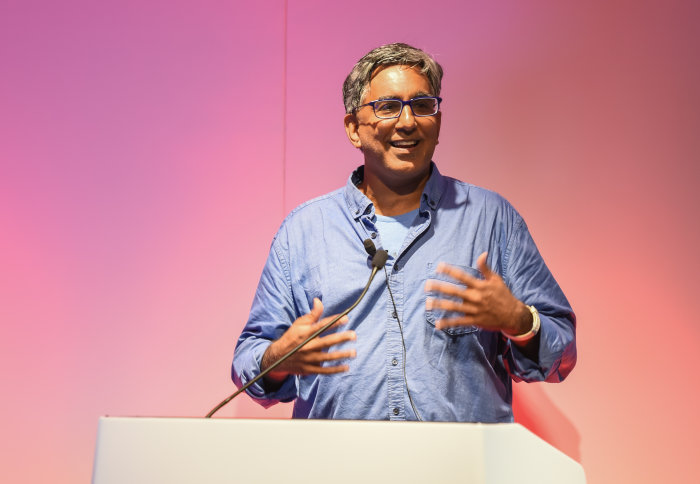The US should help Venezuela to economic recovery says expert

President Donald Trump could use an executive order to permit creditors to restructure Venezuela’s sovereign debt.
This was the view of Professor Mitu Gulati of Duke University, who made the comments during a talk organised by the Brevan Howard Centre for Financial Analysis at the Business School.
Professor Gulati said the most reliable figures put outstanding debt in Venezuela at between $150 billion and $200 billion as the country struggles through one of the most complicated debt restructurings in history. The situation is complicated further by a humanitarian crisis and an escalating political standoff between the country’s President, Nicolas Maduro and opposition leader Juan Guaido.
He argued conventional sovereign debt restructuring techniques will not achieve a prompt, orderly or comprehensive resolution to Venezuela’s debt crisis. This is because the state and its oil company, PDVSA, owe money to an unusually diverse group of claimants, including bondholders and holders of arbitration awards against Venezuela’s government.
The path to economic recovery
Another issue highlighted during the talk, is that Venezuela derives 95 per cent of its foreign currency earnings from the sale of oil, and the majority of the sales are made to the US. If a small group of unpaid creditors were to find a way to seize Venezuela’s oil or cash proceeds from the sale of the oil, the country’s entire economy could be strangled.
"There is a narrow window in the [US] law… [where] if you’re trying to resolve things with a foreign sovereign and, even better, one who is important to your national security, you can use your executive authority to modify the rules.” Professor Mitu Gulati, Duke University
The only viable solution, according to Professor Gulati, is to restructure Venezuela’s debt in a way that blocks holdout creditors (those not prepared to accept a debt restructuring), who could pose a lethal threat to any prospects of economic recovery. He said mismanagement and corruption have led Venezuela’s economy to halve in size in five years, one of South America’s biggest economic catastrophes.
Professor Gulati said President Trump could use an executive order - a directive which has the full force of the US law, to permit a supermajority (ie more than 50 per cent) of creditors to accept a binding debt restructuring, thereby ending Venezuela’s protracted debt crisis.
Professor Gulati said: “There is a narrow window in the [US] law… [where] if you’re trying to resolve things with a foreign sovereign and, even better, one who is important to your national security, you can use your executive authority to modify the rules.”

He discussed his solution to the debt crisis with Lee C. Buchheit, a Non Resident Fellow at the Center for Contract Law at Columbia University Law School, and Honorary Professor at the University of Edinburgh Law School.
Professor Gulati pointed to examples of when US executive orders had succeeded in solving similar debt restructuring crises. One was in Iraq in 2004, when the country was under US-imposed sanctions and its leader Saddam Hussein continued to borrow. Like Venezuela, Iraq had diverse creditors and was an oil-rich country which derived virtually all of its earnings from selling oil.
However, he added critics argue markets may dislike the use of an executive order, claiming borrowing costs could rise because debt restructuring will become too easy; and that whenever there is a crisis a US president will solve it with an executive order. This could deter fresh investment into a country that desperately needs it, although he thinks these concerns are overblown.
Another problem is that US-imposed sanctions have made it difficult to calculate Venezuela’s debt stocks, said Professor Gulati. The Trump administration cut the country’s state-owned oil company supply of foreign capital shortly after it recognised opposition leader Juan Guaido as the country’s legitimate president.
Professor Gulati said: “We don’t know what the Venezuelan debt instruments are trading at. We don’t know who is owning what. Knowing which creditors own what assets is crucial when you’re designing a restructuring, as you want to know what their reliability is.”
Solving the humanitarian crisis
But before any creditors can claim assets, Venezuela must first focus on solving its humanitarian crisis, said Honorary Professor Buchheit. This means obtaining potentially billions of dollars to staunch the crisis that has already led to 3.5 million refugees fleeing the country because of a lack of food and nutrition, hyperinflation and a de-stabalised exchange rate, in addition to the complicated debt crisis.
In opening remarks Professor Francisco Veloso, Dean of Imperial College Business School, highlighted how the event chimes with the Business School’s mission to drive positive change around the world.
He said: “We are tackling this head on through our academics, who are looking at issues such as what happens to access to information, how do you think about pricing bitcoin and cryptocurrencies, how do you handle high speed trading, and unleash all of this tech to change finance at all levels, to empower people to manage their household finances? These are all things at the heart of what we are doing at the Business School, [so as] to really be at the forefront of this change.”
Article text (excluding photos or graphics) © Imperial College London.
Photos and graphics subject to third party copyright used with permission or © Imperial College London.
Reporter
Laura Singleton
Communications Division